 Petzlover
Petzlover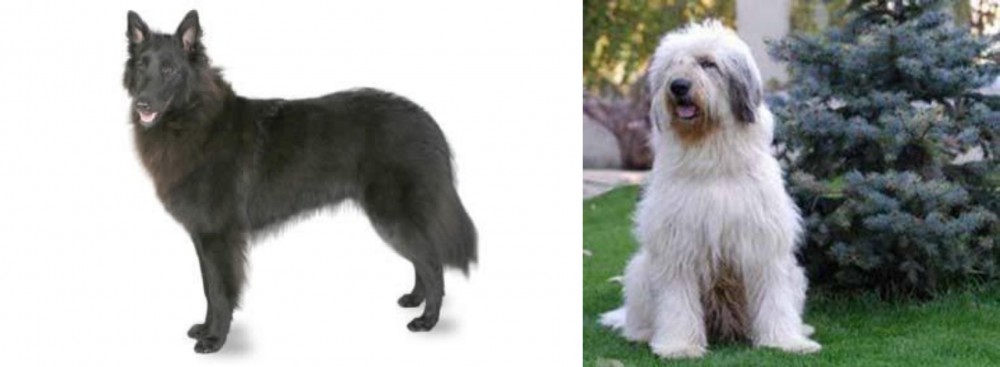 Belgian Shepherd is originated from Belgium but Mioritic Sheepdog is originated from Romania. Belgian Shepherd may grow 9 cm / 3 inches shorter than Mioritic Sheepdog. Belgian Shepherd may weigh 30 kg / 66 pounds lesser than Mioritic Sheepdog. Both Belgian Shepherd and Mioritic Sheepdog has same life span. Both Belgian Shepherd and Mioritic Sheepdog has almost same litter size. Both Belgian Shepherd and Mioritic Sheepdog requires Moderate Maintenance.
Belgian Shepherd is originated from Belgium but Mioritic Sheepdog is originated from Romania. Belgian Shepherd may grow 9 cm / 3 inches shorter than Mioritic Sheepdog. Belgian Shepherd may weigh 30 kg / 66 pounds lesser than Mioritic Sheepdog. Both Belgian Shepherd and Mioritic Sheepdog has same life span. Both Belgian Shepherd and Mioritic Sheepdog has almost same litter size. Both Belgian Shepherd and Mioritic Sheepdog requires Moderate Maintenance.
 There are different varieties of the Belgian Shepherd Dog – but these all differ only in color, length and texture of coat. The interesting aspect of the names of the different Belgian Shepherds, is that the names of the different varieties are taken from the individual towns in Belguim from which each variety comes from.
There are different varieties of the Belgian Shepherd Dog – but these all differ only in color, length and texture of coat. The interesting aspect of the names of the different Belgian Shepherds, is that the names of the different varieties are taken from the individual towns in Belguim from which each variety comes from.
This breed dates back to the middle ages, but it was only in 1891 that Professor A. Reul of the Cureghem Veterinary Medical School established standards for the types and actually separated- and distinguishing them. In the UK they are shown as one breed.
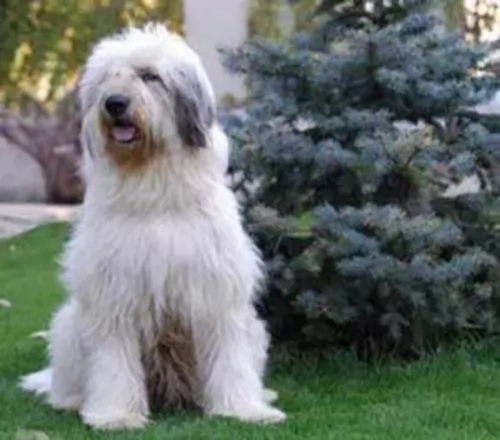 This is a large dog coming from the Carpathian mountain area of Romania.
This is a large dog coming from the Carpathian mountain area of Romania.
He has always been an excellent working dog, guarding and protecting sheep. Farmers always kept these dogs as working dogs, with no written records being kept about the development of the breed.
The breed is ancient, possibly dating back to ancient Roman times. It was in the 20th century that interest in the breed was ignited, and in 1981 the first official breed standard was recorded. The breed was also registered with the Federation Cynologique Internationale in 2005.
 The Belgian Shepherd is a well proportioned, muscular medium-to-large dog breed. There are the different varieties but they generally stands at 56 – 66cm in height and weighs anything from 25 to 30kg. You get the short haired Malinois and then you also get the Belgian Tervuren and the Groenendal which are fairly long-haired varieties. Their colour shades vary so you can find black with white markings on the chest and feet, you can find light to dark brown and some are even inclined to be brown.
The Belgian Shepherd is a well proportioned, muscular medium-to-large dog breed. There are the different varieties but they generally stands at 56 – 66cm in height and weighs anything from 25 to 30kg. You get the short haired Malinois and then you also get the Belgian Tervuren and the Groenendal which are fairly long-haired varieties. Their colour shades vary so you can find black with white markings on the chest and feet, you can find light to dark brown and some are even inclined to be brown.
All the varieties have long tails, pointed, fully erect ears and black noses. While the Belgian Shepherd isn’t an aggressive dog, he makes an excellent guard dog, being alert, highly energetic and intelligent and easy to train. As with most other dogs, you’ll want to see to it that he is trained and socialized because then he makes a super pet suited to life with a family where there are children and other pets. He has an independent nature and is loyal and protective with his human family.
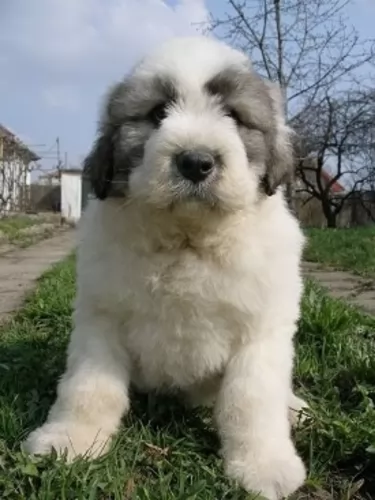 The Mioritic Sheepdog looks very much like the Old English Sheepdog with his huge body covered with long hair.
The Mioritic Sheepdog looks very much like the Old English Sheepdog with his huge body covered with long hair.
His head is also large with a black nose and smallish to medium length floppy ears. The color of the double coat is usually white, cream or pale gray, and sometimes you will find patches of these colors.
The tail has always been traditionally docked, otherwise the tail is left long with a slight curl at the end. The height of the dog is 65 to 75cm and he weighs roughly 50–60kg. Below the thick coat is a muscular dog with strong, straight legs which can help him become quite agile and speedy when needed. Allowed to breed, they can produce anything from 3 to 9 of the most adorable looking puppies.
The Mioritic Sheepdog is a balanced dog, loving to be with his owners but being wary of strangers. He is a brave dog, willing to guard his human family with his life.
He is also a strong-willed and dominant so it will be to his benefit to be trained and socialized so that he becomes obedient and easy to have around.Training won’t be difficult as he is an intelligent breed and already naturally obedient.
He is an energetic dog too so he will need to have regular exercise and games. He therefore gets on well with children in the home, loving to join in with all their games. He will need to be supervised around small children just because of his cumbersome, large size.
 Energy is a big factor with this beautiful dog, so before you consider one as a pet, be sure that you can take care of his exercise needs. He belongs to the working group of dogs so he won’t enjoy just lazing around day after day. He is wired to be herding livestock and that natural instinct doesn’t disappear once he becomes a pet in your home. With so much energy, he wants a nice sized garden and wouldn’t do well cooped up indoors at all.
Energy is a big factor with this beautiful dog, so before you consider one as a pet, be sure that you can take care of his exercise needs. He belongs to the working group of dogs so he won’t enjoy just lazing around day after day. He is wired to be herding livestock and that natural instinct doesn’t disappear once he becomes a pet in your home. With so much energy, he wants a nice sized garden and wouldn’t do well cooped up indoors at all.
He is a strong, loving dog, and in exchange for your care of him, he will be a loyal, loving, protective friend who will love you to the end.
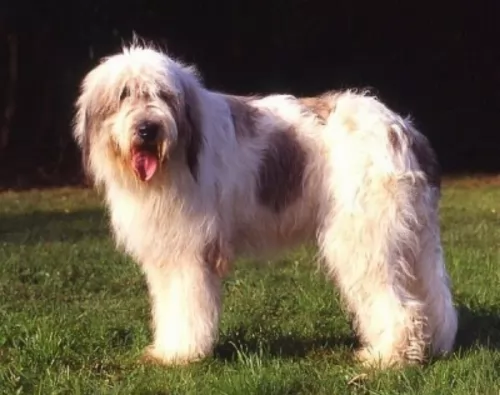 The Mioritic Shepherd has always been used to guard and protect livestock, but even though he has always taken this role seriously, he is calm and loving around his human family, making a splendid family pet.
The Mioritic Shepherd has always been used to guard and protect livestock, but even though he has always taken this role seriously, he is calm and loving around his human family, making a splendid family pet.
He also plays the role of guardian and protector of his human family seriously. He is a big strong dog and training and socialization will become necessary as he can become aggressive with certain people who he doesn’t trust.
Inviting one of these dogs into your home will ensure having a constant and loving companion at your side.
 The Belgian Shepherd is a hardy dog so if you do your part to provide him with good quality nutrition from the food he eats and you exercise him, he’ll reach the 10-14 years allotted to him.
Just like with any dog, there will be some minor concerns that you need to watch out for -
The Belgian Shepherd is a hardy dog so if you do your part to provide him with good quality nutrition from the food he eats and you exercise him, he’ll reach the 10-14 years allotted to him.
Just like with any dog, there will be some minor concerns that you need to watch out for -
epilepsy, eye problems, cancer, skin allergies and hip dysplasia.
remember to check his teeth and for ticks and parasites as both, if just left, can jeopardise his health seriously.
see that he get his first puppy vaccinations at 6 to 8 weeks of age.
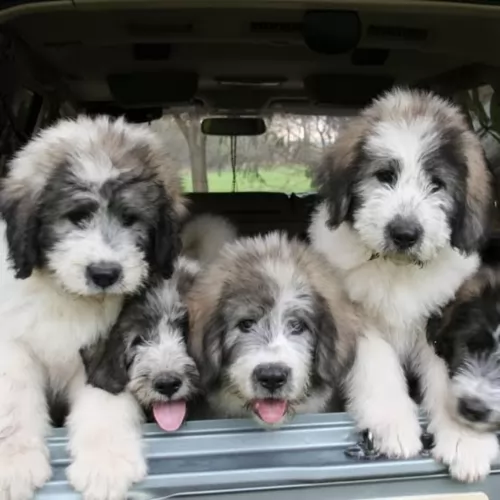 The Romanian Mioritic Shepherd Dog is a truly hardy dog breed and with good care such as good food and exercise can reach 14 years of age.
The Romanian Mioritic Shepherd Dog is a truly hardy dog breed and with good care such as good food and exercise can reach 14 years of age.
There are always some common dog illnesses to look out for and because he is a large dog, hip dysplasia can be a problem.
This is a disease where there is abnormal growth of the hip joints. Smooth movement of the joint is hindered and this leads to inflammation and pain.
At first you may find your dog limping and then you may find that after lying down, he battles to get up again. The joint becomes thickened with less mobility and the dog is reluctant to play like he used to. He will certainly need to get to the vet for treatments to make him more comfortable.
 Your Belgian Shepherd is an energetic dog breed who is social and who wants to be included in your family activities. You can’t just keep him cooped up in your back yard and expect him to do well. He’ll need daily exercise – walks, swims if there is water close by, chasing the ball as well as your companionship.
Your Belgian Shepherd is an energetic dog breed who is social and who wants to be included in your family activities. You can’t just keep him cooped up in your back yard and expect him to do well. He’ll need daily exercise – walks, swims if there is water close by, chasing the ball as well as your companionship.
These dogs are shedders so you’ll certainly be needing to watch your clothes for hairs. You will need to give them a good brush at least twice a week to get rid of all that loose hair and to keep his coat shiny and in tip top condition. Also, he likes the closeness the brushing provides between him and his human caretaker.
The Belgian Shepherd is a robust, healthy breed of dog, but many ill dogs are brought to veterinary clinics because they are suffering with itchy skin problems, they have digestive problems and they’re generally run down. This is because they aren’t provided with a varied and balanced diet plan. Apart from eating a quality dry- or wet dog food as recommended by your vet, he’ll most certainly need some raw meat in his diet too.
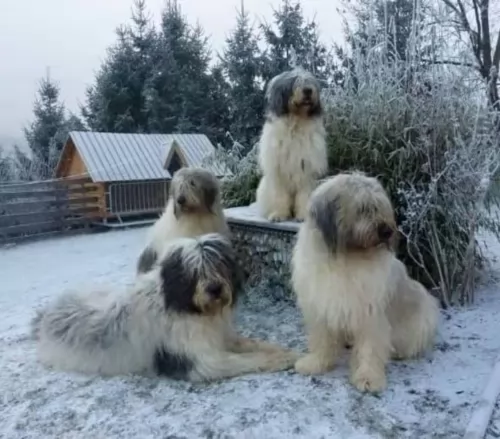 The Mioritic Sheepdog’s long hair is coarse and will need to be regularly brushed to keep it free of tangles. It will certainly need to be brushed 2 or 3 times a week, while some owners of this dog will prefer to have the coat professionally clipped. Because of the long hair, while brushing him it is an excellent time to check for ticks and fleas.
The Mioritic Sheepdog’s long hair is coarse and will need to be regularly brushed to keep it free of tangles. It will certainly need to be brushed 2 or 3 times a week, while some owners of this dog will prefer to have the coat professionally clipped. Because of the long hair, while brushing him it is an excellent time to check for ticks and fleas.
The food you give your pet plays such a critical role in his health and longevity. Always make sure that you’re giving your pet an uncomplicated diet to avoid stomach upsets.
Give him the best commercially manufactured kibble. To provide him with some variety, add in some boiled chicken, cooked vegetables such as potato, carrots and spinach to his kibble from time to time. He will also benefit greatly from having some raw meat added into the kibble occasionally.
Learn to know which human foods are totally toxic to him and avoid these. Make sure he is never without cool, fresh water.